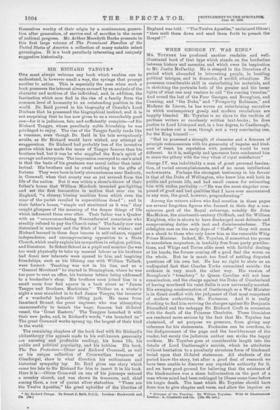SIR RICHARD TANGYE.* .
ONE must always welcome any book which enables one to understand, in however small a way, the springs that prompt another to action. This is especially the case when such a book possesses the interest always aroused by an analysis of the character and motives of the individual, and, in addition, the fascination which men find in the rise of a family from the common level of humanity to an outstanding position in the world. Dr. Reid proved in his biography of Canada's Lord Durham that he possessed the biographical instinct, and it is not surprising that he has now given to us a remarkably good one—for it is judicious, fair, and sufficiently complete—of Sir Richard Tangye, whose peculiarly noble friendship he was privileged to enjoy. The rise of the Tangye family reads like a romance, even though Dr. Reid in his tale scrupulously avoids, as Sir Richard would have wished, any attempt at exaggeration. Sir Richard had probably less of the inventive genius which has made the name of Tangye famous than his brothers had, but it was he who supplied the firm's spirit of courage and enterprise. The impression conveyed to one's mind is that the basis of his greatness was moral rather than intel- lectual. His brothers and he owed nothing to the gifts of fortune. They were born in lowly circumstances near Redruth, in Cornwall, when that county was as yet severed from the life of the nation. But it was within a stone's-throw of their father's house that William Murdoch invented gas-lighting and set the first locomotive in motion that ever ran in England, "a clumsy, hissing machine from which even the vicar of the parish recoiled in superstitious dread "; and in their father's house, "simple and straitened as it was," they caught glimpses of the meaning of the deeper things of life which influenced them ever after. Their father was a Quaker with an " unaccommodating Nonconformist conscience who steadily refused to pay the Church rates." The family cow was distrained in summer and the flitch of bacon in winter ; and Richard learned in these days lessons in self-reliance, rugged independence, and uncompromising opposition to a State Church, which easily explain his sympathies in religion, politics, and literature. In Sidcot School as a pupil and monitor (ho was too weak physically to take up manual labour as his brothers had done) new interests were opened to him, and inspiring friendships, such as his lifelong one with William Tallack, were formed. Teaching was not in his line, and as a "General Merchant" lie started in Birmingham, where ho was too poor to rent an office, his business letters being addressed to a bookseller's shop. His brothers soon joined him in a small room four feet square in a back street as "James Tangye and Brothers, Machinists." Thither on a winter's night a man stumbled in to find James Tangye, the inventor of a wonderful hydraulic lifting jack. Ho came from Jeambard Brunel, the great engineer, who was attempting unsuccessfully to launch the huge, famous, but ill-fated vessel, the ' Great Eastern.' The Tangyes launched it with their new jacks, and, in Richard's words, "she launched us." The great Cornwall works sprang up, the largest of their kind in the world.
The remaining chapters of the book deal with Sir Richard's philanthropy (the appeals made to his well-known generosity are amusing and profitable reading), his home life, his public and political popularity, and his bobbies. His book, The Two Protectors—Oliver and Richard Cromwell, as well as his unique collection of Cromwellian treasures at Glendorgal, show in what direction his enthusiasm and historical sympathy lay. Dr. Reid gives one story which came too late to Sir Richard for him to insert it in his book. Here it is :—Oliver Cromwell on one of his journeys entered a country church, and was shown its treasures, and, chief among them, a row of quaint silver statuettes, "These are the Twelve Apostles," the great upholder of the liberties of
• Sir Richard Tame, By Stuart 3, Bold, D.C.L. London I Duckworth and
CO. Pal
England was told. "The Twelve Apostles," exclaimed Oliver ; " then melt them down and send them forth to preach the Gospel I "


























































 Previous page
Previous page